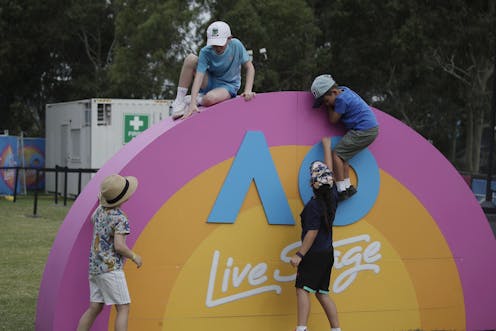We asked Australian children what they needed from their communities. Here's what they said
- Written by Sharon Bessell, Professor of Public Policy, Crawford School of Public Policy, Australian National University

What does a “fair go” look like for Australian children? We asked 130 children aged between seven and 13 years what makes communities strong, supportive, and fair[1].
Many felt communities are about care and connection. As one ten-year-old girl said, “a community is really just a group of people that help you and always look out for you”.
The children in our research identified five themes that matter in determining whether they have a fair go – or not.
1) Good relationships[2] are essential to children’s experiences of community. An 11-year-old boy said “I love my community, because I know people and everyone is friendly”.
When children know their neighbours and are treated with respect by caring people, they feel included, safe, and supported. But too many children mentioned adults who are rude or dismissive towards them – and they usually felt it was because they were young.
2) Feeling safe[3] is very important to children – but many described the frightening ways some adults behave in their communities, most often because of excessive alcohol or drug use. Aggressive and dangerous driving also makes children feel unsafe and vulnerable in their neighbourhoods.
3) Inclusive places[4] ensure children can actively participate in their communities, but many described feeling unwelcome in public places. Some talked about places designed for very young children and places for teenagers to hang out – but said there was very little for those in middle childhood. Children wanted a say in how public places were designed. As one nine-year-old girl said, “We – us kids – should decide what playground we get, because the adults who design it don’t play on it. It’s our equipment”.
Often, children described parks that are littered with broken glass or dog poo, making them unpleasant places to play. A common concern for children is a lack of footpaths, making it hard for them to safely move around their neighbourhoods.
4) Household resources[5] make an enormous difference to whether children can make the most of their communities. Some children said their family had to move regularly because rent is so expensive. As a result, they never feel part of any place they live. Many could not afford to take part in activities in their communities.
5) Children also spoke about public good and infrastructure – things that also matter to adults[6]. Health care is high on children’s list of what is most important. This is not what we might expect young children to focus on, but many described long waits in emergency rooms when they or their families were ill or injured. Homelessness was also an issue that worried children.
A small number of those involved in the research had experienced homelessness directly – but many more observed it, and said it was deeply unfair. An eight-year-old boy said, when people are homeless “they don’t have stuff, and some people think they are not the same as us. But they are, and it’s not right”.
Read more: We asked children how they experienced poverty. Here are 6 changes needed now[7]
Children described the complexities of communities and the many factors that determine whether they have a fair go or not. Analysing the themes children identified, and the detail within each, was challenging – until a nine-year-old girl said “communities are like a jigsaw puzzle. You need to have all the pieces in place to make them work”.
And so, the community jigsaw[8] was born. The jigsaw presents the five major themes children identified, and the most important pieces within each. When all the pieces are in place, communities are strong and supportive – not only for children, but for people of all ages. As the pieces fall away, communities become less fair and children feel more vulnerable.
Our research was across communities with different socioeconomic profiles. While children in all communities raised similar issues – chidlren’s experiences varied greatly and reflected inequalities[9] in Australia. Those in more disadvantaged communities were far more likely to experience challenges.
Children living in less advantaged communities often talked about caring, friendly people who helped each other, but also described deep structural problems: a lack of public transport, poor services, few parks and playgrounds. Children from lower-income communities were more likely to describe not being able to participate in activities or visit places (such as movies or the local pool) due to the cost.
There are lessons from this research for how we can ensure every child, in every community really does have a fair go.
First, the way adults treat children, even in small, everyday encounters[10], matters. For many children, the words and gestures used by adults make them feel vulnerable and excluded.
Second, there are structural and systemic issues that mean some children do not get a fair go. From policies that fail to address poverty and disadvantage to planning that is not child inclusive, too many children are being left behind.
Two initiatives would begin to address this immediately: the adoption of child rights impact statements[11] (already in place in some parts of Australia[12]) and child-friendly planning[13].
Our research shows is it time for us to listen to children – and to act to ensure they are all safe and supported. In the process, we might make communities fairer for everyone.
References
- ^ communities strong, supportive, and fair (www.napcan.org.au)
- ^ Good relationships (developingchild.harvard.edu)
- ^ Feeling safe (www.napcan.org.au)
- ^ Inclusive places (www.theaustralian.com.au)
- ^ Household resources (theconversation.com)
- ^ matter to adults (static1.squarespace.com)
- ^ We asked children how they experienced poverty. Here are 6 changes needed now (theconversation.com)
- ^ community jigsaw (www.youtube.com)
- ^ reflected inequalities (newsroom.unsw.edu.au)
- ^ small, everyday encounters (emergingminds.com.au)
- ^ child rights impact statements (www.unicef.org.uk)
- ^ some parts of Australia (hrc.act.gov.au)
- ^ child-friendly planning (childfriendlycities.org)

















